Fears Growing Over Health Of French-Irishman Imprisoned In Iran
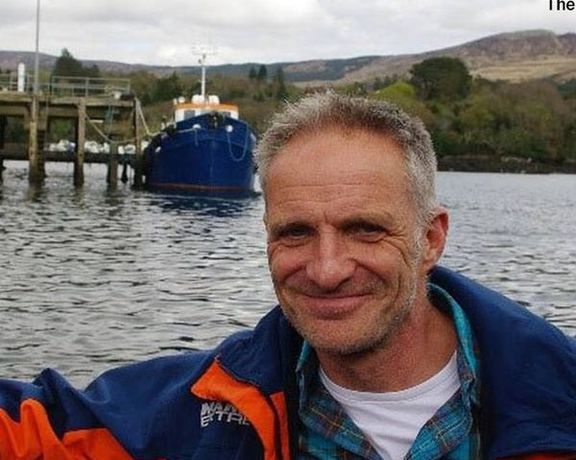
A French diplomatic source says the health condition of the Irish-French prisoner Bernard Phelan, who is behind bars in Iran, is deteriorating.

A French diplomatic source says the health condition of the Irish-French prisoner Bernard Phelan, who is behind bars in Iran, is deteriorating.
Bernard Phelan was arrested on October 3 during anti-regime protests that have swept the country following the death of Mahsa Amini in police custody on September 16.
His family says he has been on hunger strike since the beginning of the New Year and has even stopped taking medication for a heart condition. He is also refusing water.
Bernard Phelan, 64, who is a travel consultant has been accused by the Islamic Republic of "propaganda against the establishment" and "photographing police and security officers". He is imprisoned in Vakil Abad prison in Mashhad northeast of Iran.
"He is showing serious signs of physical and psychological exhaustion" added the official, saying despite repeated requests of the governments of France and the Republic of Ireland to release him for medical reasons, the Islamic Republic has refused to do so.
Phelan’s sister, Caroline Masse-Phelan, told AFP Wednesday that her brother was an innocent man detained for reasons "beyond our comprehension."
She said his health condition meant he had to be released urgently.
"It's a matter of days. He's an innocent man caught in the middle of I don't know what. He loves Iran, he is 64, sick, and wants to go home," she said.
"I think he is part of a group of Europeans imprisoned for political reasons ... of which I know nothing," his sister added. "We have nothing to do with this story."
Several foreigners visiting Iran have disappeared during the nationwide protests, confirming earlier reports that the Islamic Republic is taking foreign citizens hostage.
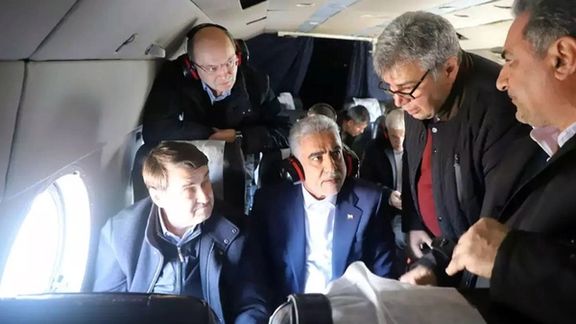
A helicopter carrying the Russian president’s aide landed on a football field in the northern city of Astara in Iran just before a game was scheduled to start.
Mehr news agency claimed Wednesday that this was due to "security issues" which caused a 40-minute delay in the match that was supposed to be held in the stadium.
The report adds that Igor Levitin along with the governor of Iran’s Gilan province, the deputy minister of roads and Astara's MP were onboard the chopper headed to Astara to launch a railway project between Iran and Russia, but their copter suddenly landed in the stadium.
Iranian media have reported that half an hour before the start of the match, helicopters landed without any prior notice.
The claim of the presence of Putin's aide to launch the railway comes as the construction of this project has been delayed for over two decades and has not even kicked off yet.
The railway is supposed to connect Rasht in northern Iran to Astara and from there to the railway of the Azerbaijan Republic which is already connected to Russia. Iranian officials have recently announced they have begun negotiations with Moscow to develop the project.
IRNA news agency reported Wednesday that the most important achievement of Levitin’s trip to Iran so far has been the confirmation of Russia's participation in the rail project.
Russia has not yet officially announced whether it will participate in this one-billion-dollar project.

US State Department has not denied information by Iran International that US envoy Robert Malley held meetings in New York with Tehran's UN ambassador recently.
In response to questions, the State Department did confirm that messages are being delivered to the Islamic Republic of Iran, even though the nuclear deal, JCPOA, “is not on the agenda.”
In response to questions submitted by Iran International on January 17, State Department spokesperson Ned Price said, “We have the means to deliver specific and firm messages to Iran when it is in America’s interest to do so.”
Iran International had asked the DoS that according to information it obtained, US Special Representative for Iran Robert Malley met with Iran’s ambassador to the United Nations in New York, Saeed Iravani, “at least three times in the last two months.”
“But we're not going to get into details about how we deliver these messages, except to say that we do so in close coordination with allies and partners.”
In its response, the DoS did not deny or confirm Malley’s possible meetings with Tehran’s envoy but underlined that the US has its channels to communicate messages to the Iranian side.
Iran International followed up with the specific question to the State Department on January 18, “Just to confirm that you are not denying that meetings between Mr. Iravani and Mr. Malley took place in recent months in NY.”
A second response received from a spokesperson repeated that “As we have said, we have the means to deliver messages to Iran when it is in our interest to do so.”
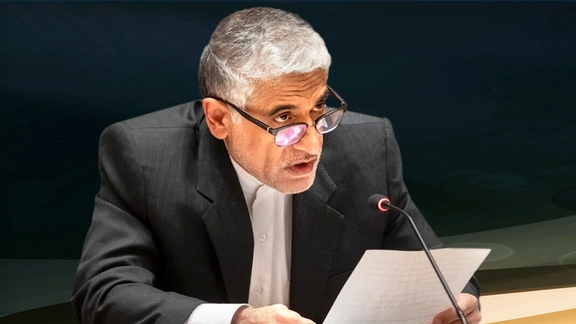
“I am not going to get into details about how we deliver these messages, but we do so in close coordination with allies and partners and make no apologies for delivering them firmly and consistently,” the spokesman responded.
Regarding the content of these messages, spokesperson Ned Price, in the first response on January 17, said, “We have consistently conveyed three messages: stop killing peaceful protesters, stop selling weapons to Russia to kill Ukrainians, and release the Americans you’ve wrongfully detained. We also use any available opportunity to make clear that we will take necessary steps to protect American citizens.”
If Malley did meet Iravani face-to-face, it would be the first reported direct meeting between US and Iranian diplomats since the Biden administration assumed office and offered talks to revive the JCPOA. Iran has consistently refused direct talks with the United States.
If any indirect talks took place between Malley and Iravani, for example, through European diplomats, the State Department chose not to specify it, except saying that Washington has the means to deliver messages to Tehran.
Asked to comment on the news, Richard Goldberg of the Washington thinktank FDD and the Director for Countering Iranian Weapons of Mass Destruction for the White House National Security Council from 2019-2020, said, "A secret backdoor betrayal of the Iranian people at this moment should be condemned by all Americans. Congress should investigate these reports thoroughly and anyone involved should be compelled to testify."
Tehran’s deadly suppression of protests since mid-September and its delivery of kamikaze drones to Russia, being used to attack Ukrainian civilian infrastructure, have heightened tensions between the Islamic Republic and Western powers. Also, 18 months of talks to restore the 2015 nuclear accord reached a deadlock right before protests broke out in Iran.
European countries and institutions are debating about listing the Revolutionary Guard as a terrorist organization, which would further reduce the chances of any foreseeable improvement in relations.
While Iran can free some of the thousands of detained prisoners, the ongoing violations of human rights both inside and outside the prisons are so widespread, that the whole security and judicial system must be overhauled before any meaningful change takes place.
In addition, Iran is not expected to end its close military and other types of cooperation with Russia, to satisfy Western demands before any nuclear talks can be resumed.
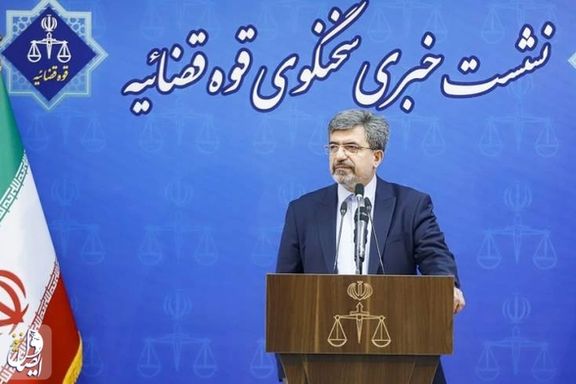
Iran’s judiciary spokesman claims about 98 percent of those arrested in Tehran province during the nationwide protests have been released, without mentioning a total number.
Masoud Setayeshi said Wednesday that a total of 5,200 people arrested in the capital Tehran have been freed.
Setayeshi had previously announced 1,200 detained demonstrators across the country had been released, alleging that “a population of about 4,000 people are now freed from prisons throughout the country.”
However, he did not provide any details about the current legal status of the 5,200 people and refused to say how many of them been released on bail or awaiting trial.
The judiciary spokesperson noted that the number of detainees released in Tehran province is "98.5% and it seems to be the same across the country".
It is not clear what the reason for this ambiguity is, but if the percentage is true, the total number of detainees based on the claim of the Judiciary spokesperson is less than 5,500 people, which is so different from the numbers provided by human rights organizations.
Some human rights sources say between 19,000 and 20,000 people have been detained during the suppression of the protests following the death of Mahsa Amini in police custody four months ago.
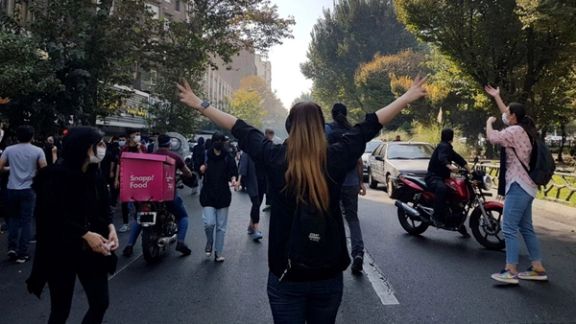
However, all those who are released have emphasized their release is "temporary" and on bail.
According to a part of the Fars news agency's confidential bulletins that were leaked last month, "29,400 people" had been arrested during the recent protests in Iran.
Setayeshi also talked about the execution of the British-Iranian national Alireza Akbari, but without mentioning the details of the case, he called the UK’s strong reaction a sign of "the malevolence of the British government."
Alireza Akbari was one of Iran's senior military and defense officials in early 2000s. He travelled to Britain with his family and became a citizen of the UK, but the Iranian regime claims granting him the citizenship was a "reward" for "espionage".
Akbari was arrested in 2019 while travelling from the United Kingdom to Iran and sentenced to death for spying for Britain.
On January 14, the Iranian Judiciary announced Akbari had been hanged after having been convicted of espionage.
Setayeshi said that his execution was a sign of Iranian Judiciary’s “strength and sensitivity,” adding, “
British Prime Minister Rishi Sunak condemned Akbari's execution, saying “this was a callous and cowardly act, carried out by a barbaric regime with no respect for the human rights of their own people.”
Elsewhere in his remarks, Setayeshi once again accused detained Belgian national Olivier Vandecasteele of “espionage” stressing that there will be no "concessions" in his case.
Vandecasteele, who was detained in 2022, has been sentenced to 40 years in prison in a secret trial without a fair chance to defend himself.
He worked in Iran for humanitarian organizations for more than six years and left the country. Later, he was lured back by “a girlfriend” and was detained in February 2022.
Belgium and Vandecasteele’s family believe he is innocent and a victim of hostage taking by the Iranian regime. They say Tehran intends to force Brussels to release Iranian diplomat Assadollah Assadi who was sentenced to 20 years in prison in Belgium in 2021.
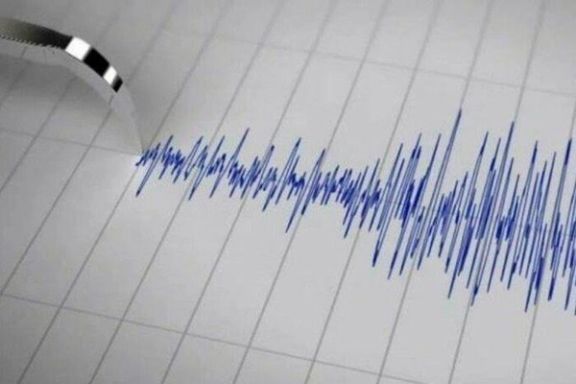
An earthquake of magnitude 5.4 has struck the northwestern Iran, in Western Azarbaijan Province Wednesday.
Iranian state media reported that rescue teams are dispatched to the quake-hit area in Khoy but have not reported any casualties yet.
Red Crescent official Morteza Moradipour told ISNA news agency that an earthquake of 5.4 magnitude hit Khoy city at 13:38 p.m.
According to him, the quake was at the depth of 12 kilometers.
He stated that about 20 minutes before the earthquake, a 3.6-magnitude foreshock was felt in the same area at a depth of 13 kilometers; therefore, the rescue teams had already been ready and dispatched to the earthquake-affected area promptly.
Iran is crisscrossed by major geological fault lines and is one of the most earthquake-prone countries in the world because it is located where the Arabian, Indian, and Eurasian tectonic plates meet.
Iran has had a terrible history of massive earthquakes in recent decades, with some killing up to tens of thousands of people and causing billions in damages, such as the magnitude 6.6 quake in Kerman province in 2003 that killed 31,000 people and flattened the ancient city of Bam.
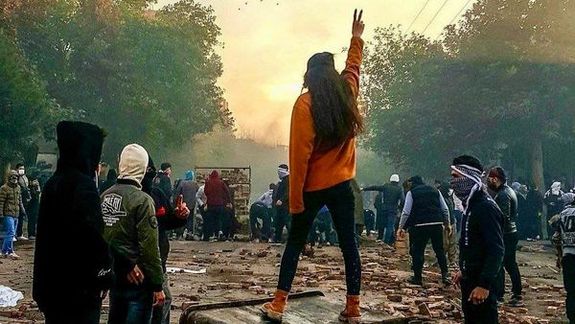
An expert in Tehran says Iran's foreign policy crisis, with its regional and international isolation, has its roots in the impasse in domestic domestic politics.
Academic Mehdi Zakerian told Ropydad24 website January 17, that the Iranian government's only solution for its foreign policy crisis is to garner the nation's support and trust. However, he noted that the country's rulers can always choose between the people and their unilateral decision making.
Zakerian explained that in modern politics, the country's national interests are the same as the nation's demands. He said government employees, workers, those who run a business, teachers, nurses and the like are finding it difficult to make ends meet, but President Ebrahim Raisi speaks on the state television in a way as if all the problems have been solved and the country's long-standing recession has ended.
In the area of foreign policy, Iran needs balanced relations with all other countries. Foreign relations are based on meeting both sides' needs. But when one country has more needs, other countries can take advantage of it. As an example, he said, "Russia is using Iran as a tool to get itself out of the quagmire."
Zakerian added that Russia wishes to prolong Iran’s nuclear dispute with the West so that it can extract more concessions from Iran. It can also dictate its own policy about oil and gas trade on Tehran by promising to rescue “Iran from its international isolation.” He said, "Russia is using Iran as its bridge to victory, although there is no prospect for Putin's victory in Ukraine."
The pundit argued that some Iranian decision-makers may know about this situation, but Tehran's isolation leaves no other option for it than going toward Russia and China. "At the time being, Russia is entangled in a self-inflicted situation in Ukraine and China has boldly set aside Iran and embraced Arab states.

Zakerian pointed out that because of Tehran's violations of its commitment under the JCPOA and insistence on boosting uranium enrichment it can no longer call for an agreement with the United States even if some officials genuinely wish to reach a deal. Meanwhile, like many Iranian analysts, Zakerian also said that the ongoing protests in Iran and the government's violent crackdown on dissent has sharply reduced its power on the international scene.
As a result, he said, Europe, the United States and China are no longer interested in continuing talks over the revival of the 2015 nuclear deal.
Other reports in Iranian media had said earlier that even Iran's neighbors no longer take their relations with Tehran seriously. Iraqi officials have undermined Baghdad's friendship with Tehran by insisting on calling the Persian Gulf "the Arabian Gulf."
On the other hands China’s President Xi Jinping challenged Iran's ownership of three Persian Gulf islands during a recent visit to Riyadh in December. In the most recent development, South Korea’s President Yoon Suk Yeol characterized Iran as the United Arab Emirate's prime enemy during a recent visit to Abu Dhabi.
Iran’s foreign minister Amir-Abdollahian was harshly criticized by some Iranian politicians and social media activists last week for promising to send free oil to Lebanon via the Hizballah group while people in Iran are hit by one of the hardest cold weathers in several years.
According to international relations expert Mehdi Zakerian, the only way out of this disgraceful situation for Tehran's leaders is to get the nation involved in decision making on key issues such as returning to the JCPOA, doing away with the morality police and resolving other domestic and international issues. However, to get people involved in decision making cannot be done overnight. It requires essential reforms, free and fair elections, transparency, accountability and controlling the heavy-handed security forces and judiciary that do not allow any voice other than that of pro-government hardliners to be heard.